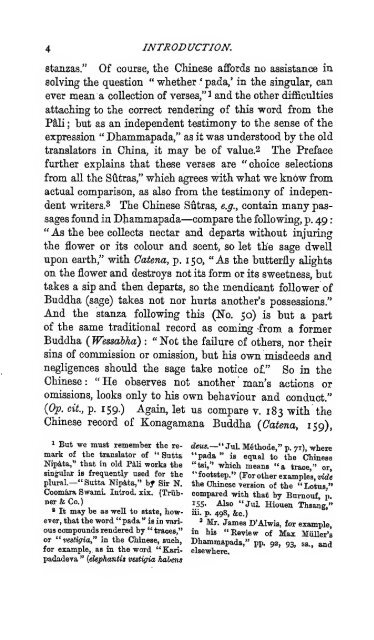Texts from the Buddhist canon : commonly known as Dhammapada
Texts from the Buddhist canon : commonly known as Dhammapada
Texts from the Buddhist canon : commonly known as Dhammapada
You also want an ePaper? Increase the reach of your titles
YUMPU automatically turns print PDFs into web optimized ePapers that Google loves.
4<br />
INTRODUCTION.<br />
stanz<strong>as</strong>." Of course, <strong>the</strong> Chinese affords no <strong>as</strong>sistance in<br />
solving <strong>the</strong> question " whe<strong>the</strong>r ' pada/ in <strong>the</strong> singular, can<br />
ever mean a collection of verses,"! and <strong>the</strong> o<strong>the</strong>r difficulties<br />
attaching to <strong>the</strong> correct rendering of this word <strong>from</strong> <strong>the</strong><br />
P§,li ; but <strong>as</strong> an independent testimony to <strong>the</strong> sense of <strong>the</strong><br />
expression " <strong>Dhammapada</strong>," <strong>as</strong> it w<strong>as</strong> understood by <strong>the</strong> old<br />
translators in China, it may be of value.2 The Preface<br />
fur<strong>the</strong>r explains that <strong>the</strong>se verses are "choice selections<br />
<strong>from</strong> aU. <strong>the</strong> Siitr<strong>as</strong>," which agrees with what we kn6w <strong>from</strong><br />
actual comparison, <strong>as</strong> also <strong>from</strong> <strong>the</strong> testimony of indepen-<br />
dent writers.3 The Chinese Sutr<strong>as</strong>, e.g., contain many p<strong>as</strong>-<br />
sages found in <strong>Dhammapada</strong>—compare <strong>the</strong> following, p. 49<br />
" As <strong>the</strong> bee collects nectar and departs without injuring<br />
<strong>the</strong> flower or its colour and scent, so let <strong>the</strong> sage dwell<br />
upon earth," with Catena, p. 150, "As <strong>the</strong> butterfly alights<br />
on <strong>the</strong> flower and destroys not its form or its sweetness, but<br />
takes a sip and <strong>the</strong>n departs, so <strong>the</strong> mendicant follower of<br />
Buddha (sage) takes not nor hurts ano<strong>the</strong>r's possessions."<br />
And <strong>the</strong> stanza following this (N"o. 50) is but a part<br />
of <strong>the</strong> same traditional record <strong>as</strong> coming -<strong>from</strong> a former<br />
Buddha {Wcssallid) :<br />
"Not <strong>the</strong> failure of o<strong>the</strong>rs, nor <strong>the</strong>ir<br />
sins of commission or omission, but his own misdeeds and<br />
negligences should <strong>the</strong> sage take notice of" So in <strong>the</strong><br />
Chinese : " He observes not ano<strong>the</strong>r man's actions or<br />
omissions, looks only to his own behaviour and conduct."<br />
(Op. cit, p. 159.) Again, let us compare v. 183 with <strong>the</strong><br />
Chinese record of Konagamana Buddha (Catena, 159),<br />
1 But we must rememter <strong>the</strong> re- deuj.—" JuL M^thode," p. 71), where<br />
mark of <strong>the</strong> translator of " Sutta "pada" is equal to <strong>the</strong> Chinese<br />
Nip&ta," that in old PaU works <strong>the</strong> "tsi," which means "a trace," or<br />
singular is frequently used for <strong>the</strong> "footstep." (For o<strong>the</strong>r example's vide<br />
plural.—"Sutta NipMa," hf Sir N. <strong>the</strong> Chinese version of <strong>the</strong> "Lotus "<br />
Coom&ra Swami. Introd. xix. (Trub- compared with that by Eurnouf, p.<br />
^^^l^Go.) 155. Also "Jul. Hiouen Thsang,"<br />
' It may be <strong>as</strong> well to state, how- iii. p. 498, &c.)<br />
ever, that <strong>the</strong> word "pada " Is in vari- ' Mr. James D'Alwis, for example<br />
ous compounds rendered by "traces," in his "Eeview of Max MiiUer's<br />
or "vestigia," in <strong>the</strong> Chinese, such, <strong>Dhammapada</strong>," pp. 92, 93 ss. and<br />
for example, <strong>as</strong> in <strong>the</strong> word " Kari- elsewhere. ' '<br />
padadeva " [elephantis vestigia habens<br />
:





